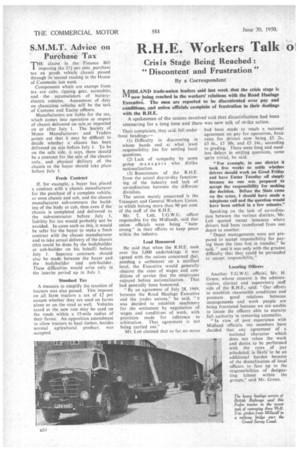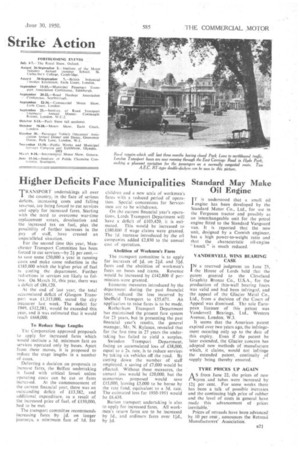R.H.E. Workers Talk 6
Page 38

Page 39

If you've noticed an error in this article please click here to report it so we can fix it.
Strike Action
Crisis Stage Being Reached : "Discontent and Frustration"
By a Correspondent MIDLAND trade-union leaders said last week that the crisis stage is now being reached in the workers' relations with the Road Haulage Executive. The men are reported to be discontented over pay and conditions, and union officials complain a frustration in their dealings with the R.H.E.
A spokesman of the unions involved said that dissatisfaction had been simmering for a long time and there was now talk of strike action.
Their complaints, they said, fell under three headings:— (1) Difficulty in discovering in whose hands and at what level responsibility lies for settling local questions.
(2) Lack of sympathy by some group managers . who dislike nationalization.
i3) Remoteness of the R.H.E. from the actual day-to-day functioning of the industry and lack of co-ordination between the different • divisibns.
The union mainly concerned is the Transport and General Workers Union. to which belong more than 90 per cent. of the staff of the R.H.E.
Mr. T. Lett, T.G.W.U. officer responsible for the Midlands, said that union officiats were being "hamstrung" in their efforts to keep peace within the industry.
Lead Honoured
He said that when the R.H.E. took over the 3,000 undertakings it was agreed with the unions concerned that. pending a settlement on a natienal level. the Executive would generally observe the rates of Wages and conditions of service that the employees enjoyed before nationalization. That had generally been honoured.
" By an agreement of July 28, 1949, between the Road Haulage Executive and the trades unions," he said, "it was decided to establish machinery for the settlement by negotiation of wages and conditions of work, with provision made for reference to arbitration. That agreement is not being carried out."
Mr. Lett claimed that so far no move had been made to reach a national agreement on pay for operatives, basic rates for drivers now being £5 2s., £5 6s.. £5 10s. and £5 14s., according to grading There were long and needless delays in settling questions, some goite trivial, he said.
"For example, in one district it took five weeks to settle whether drivers should work on Good Friday and have Easter Tuesday off simply because no one was prepared to accept the responsibility for making the decision. Before the State came on the scene, I should have made a telephone call and the question would have been settled in a few minutes."
Speaking on the lack of co-ordination between the various districts,-Mr. Lett quoted recent instances where drivers had been transferred from one depot to another.
"Depot managements were not prepared to accept responsibility for paying them the time lost in transfer," he said, " and it was only with the greatest difficulty that they could be persuaded to accept responsibility."
Locating Officers
Another T.G.W.U. official, Mr. H. Green, whose concern is the administrative, clerical and supervisory staff side of the R.H.E., said: "Our efforts to establish reasonable conditions and promote good relations between managements and work people are being frustrated because we are unable to locate the officers able to exercise full authority in removing anomalies.
"In view of past experience with Midland officials, my members have decided that any agreement of a national character which does not relate the work and duties to be performed with the rates of pay scheduled, is likely tobe an additional burden because of the disinclination of local officers to face up to the responsibilities of designating labour within the groups," said Mr. Green.




























































































































